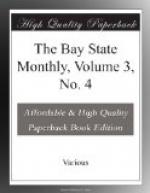The limits of this article will not permit an extended notice of all the acts which make up the creditable and patriotic record of the town. Descended from those, who, through hardship and toil, labored for the common good, and bore each other’s burdens, it is naturally to be expected that the people of Hingham aided the cause of freedom and the liberties of their country by resolutions and votes, and by liberal supplies of money. Nor did they hesitate to take up arms and sacrifice their lives for their country’s good. From the beginning to the end of the Revolution, in many a hard-fought battle, in the sufferings and hardships of camp and march, from the struggle on Breed’s Hill to the brilliant affair of Yorktown, we find the names of Hingham men mentioned with honor. And how could it be otherwise? If heredity tells for anything the whole history of the early struggles of the infant colonies was a guarantee that sturdy traits would be found in the descendants of the first settlers. In the world’s history we find no higher type of patriotism than on the barren, rocky shores of Massachusetts. It is undoubtedly true that there were some whose sympathies were not with the principles which inspired the majority of the people of that day, who were distrustful of the consequences which would result from failure, and who gave but feeble encouragement. We find such in every age and country. But it must be put down to the credit of even these few that they paid heavy taxes without resistance, and yielded to the popular will after independence was once declared. “Royalists as well as republicans, tories as well as whigs, gave of their substance to establish the liberties of their country.”
The acts and motives of the men of this town deserved to be crowned with that success which came in due season, a priceless benefit to posterity.
It was General Benjamin Lincoln, of Hingham, the wise counsellor, the foremost citizen of his time, the trusted friend of Washington, who was designated to receive the sword of Cornwallis at Yorktown. Among the many worthy and distinguished names of the sons of Hingham, that of General Lincoln stands in the foremost rank. His monument stands in the cemetery near the Old Meeting-house, characteristic of the man in its rich simplicity.
In the war of 1812, although a majority of the citizens disapproved of the State administration, “all manifested a disposition to defend their houses and firesides against the common foe, and repaired with alacrity to resist any invasion upon their neighbors.”
In the war of the Rebellion it is the same story of patriotism and a ready response to the call of the country. Early in the field and late to leave it, the record of the town does not differ from others in the State. A monument bearing the names of those who gave their lives for the country was erected in 1870, in the Hingham cemetery, near the statue of Governor Andrew.




